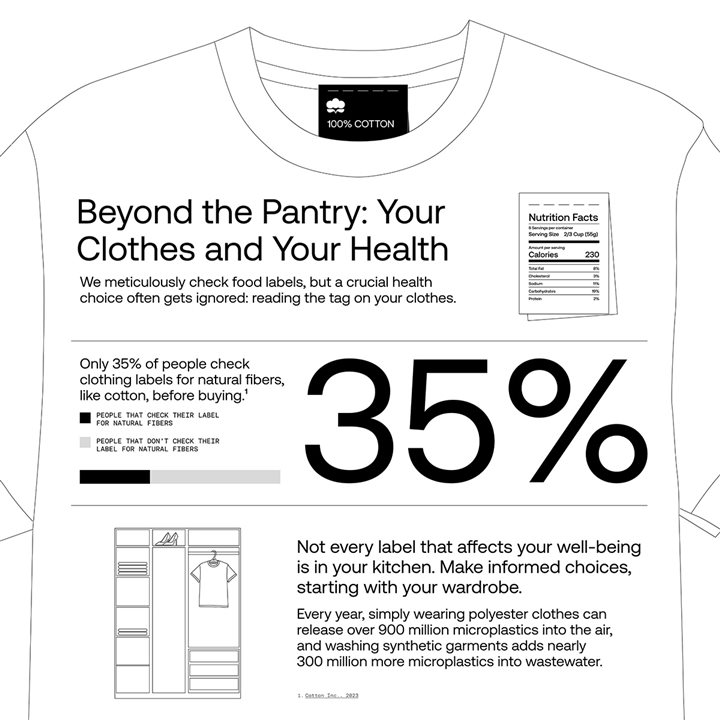(BPT) - You may have heard about microplastics in the environment, but did you know synthetic textiles are responsible for an estimated 35% of all primary microplastic pollution? Growing research about microplastics and their potential harm not just for the environment, but also for human health, has brought increasing attention to where they can be found. It's also becoming clear that people can help reduce microplastics through simple choices - such as checking clothing tags for natural fibers like cotton before making a purchase.
What are microplastics, and why do they matter?
Microplastics are very small plastic particles (less than 5 millimeters) that result from the breakdown of larger plastic items, such as fibers that can be found in synthetic textiles. With every wear and wash, synthetic materials shed tiny microplastics that then accumulate throughout homes, in waterways including the oceans, and in the air we breathe.
Alarmingly, microplastics have even been found within people's bodies, and their potential health effects are still being studied. In the last year, a growing amount of scientific evidence has confirmed a significant presence of microplastics within our bodies. Research has found that the average person inhales or ingests an estimated 74,000-121,000 microplastic particles each year, leading to plastic microfibers being found lodged deep in the lungs and even circulating in blood. Emerging research is investigating the impact microplastics may be having on health, including potential links to cardiovascular disease, infertility, and dementia.
How you can reduce your exposure to microplastics
While this news is extremely concerning, there are actions you can take that make a difference. As you're shopping for holiday gifts this year, take the opportunity to start checking the tags of clothing before you buy. Make that tiny action a habit or New Year's resolution. Just as you scan nutrition labels on food for yourself and your family, knowing that you're buying and wearing natural fibers like cotton can also provide peace of mind. Cotton not only offers comfort and breathability, but it also reduces your exposure to microplastics and the amount of microplastics in the environment.
Synthetic clothing, like polyester and rayon, are created by fibers made through chemical processes, using compounds that come from industrially sourced materials including petroleum-based chemicals and petrochemicals. Often, they're made from polyethylene terephthalate (PET), the same chemicals found in single-use plastic bottles and packaging.
Every year, simply wearing polyester apparel can release over 900 million microplastics into the air, and washing synthetic garments adds nearly 300 million more microplastics into wastewater. Overall, up to 65% of microplastics shed from synthetic textiles may be released into the air just through drying and wearing them.
By choosing natural fibers for your own clothing and for the gifts you give this holiday season, you'll be helping to decrease the amount of microplastics in the environment and in your own body.
"It's time to connect the dots between what we wear and our overall wellness," suggests Marjory Walker, vice president of Council Operations, National Cotton Council. "The materials our clothes are made from deserve the same attention we give to other aspects of our health. The power to make a more informed choice is right at your fingertips and we're encouraging a 'Tag Swap': swapping the synthetic choice for a natural one. When you see polyester or acrylic on a label, you can make a more conscious decision."
The National Cotton Council's "Plant Not Plastic" campaign urges shoppers to learn more about the importance of wearing natural fibers as part of their overall wellness routine.
"When you choose a natural fiber like cotton, you're not just avoiding plastic; you're choosing a fiber that is naturally soft, breathable, and comfortable," added Walker. "Before you buy, flip the tag and aim for 100% cotton or high-cotton blends for superior breathability, comfort, and peace of mind."
Learn more about the benefits of choosing natural fibers at PlantNotPlastic.org and follow on social: Instagram, Facebook, LinkedIn, YouTube, X, and TikTok.







